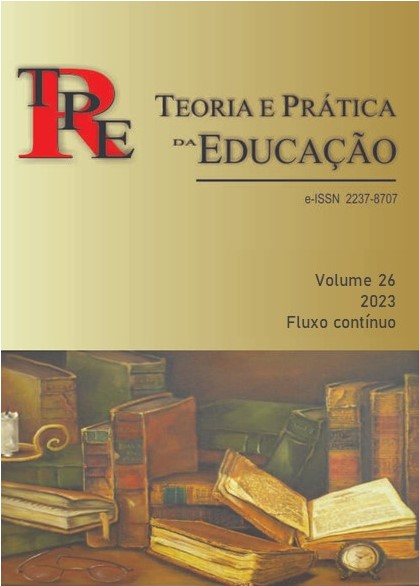A EDUCAÇÃO MIDIÁTICA E BNCC: UMA REVISÃO SISTEMÁTICA SOBRE SEUS IMPACTOS.
Resumo
O presente trabalho tem como objetivo realizar uma Revisão Sistemática da Literatura (RSL) que apresenta um compilado de pesquisas teóricas e empíricas sobre as contribuições que a Educação Midiática pode oferecer na formação integral dos estudantes, tomando como documento norteador a Base Nacional Comum Curricular (BNCC). Para a busca da bibliografia foram utilizados trabalhos escritos em língua portuguesa e publicados em periódicos no período de 2017, ano de implementação da BNCC, até 2022. A presente pesquisa torna-se relevante por apresentar dados recentes sobre a Educação Midiática e seu impacto dentro do ambiente escolar, que irá permitir ao aluno o desenvolvimento de habilidades como acessar, analisar, criar a participar de maneira reflexiva e crítica do ambiente informacional e midiático.
Downloads
Referências
Brasil. (2018). Ministério da Educação. Base Nacional Comum Curricular. Brasília.
Buckingham, D. (2010). Cultura digital, educação midiática e o lugar da escolarização. Educação & Realidade, v. 35, n. 3, p. 37-58.
Buckingham, D. (2011). David Buckingham fala sobre Educação para as mídias. [Entrevista concedida a] Rodrigo Ratier. Nova Escola, v. 239, p. 1-5, fevereiro.
Citelli, A. O. (2018). Comunicação e educação: os movimentos do pêndulo. Revista FAMECOS, v. 25, n. 3, p. ID29914, 23 ago. DOI: https://doi.org/10.15448/1980-3729.2018.3.29914
Costa-filho, I. C. (2021). Educação crítica para os meios na cidadania comunicativa: apropriações para a crítica e o diálogo. Revista Extraprensa, v. 15, n. 1, p. 81-95. DOI: https://doi.org/10.11606/extraprensa2021.192457
Galhardi (2019). Brasil é terreno fértil para fake news. Observatório da Imprensa, edição 1051. Disponível em: https://www.observatoriodaimprensa.com.br/crise-na-imprensa/brasil-e-terreno-fertil-para-fake-news/. Acesso em 12/07/2022.
Gatti, B. A. (2014). A formação inicial de professores para a educação básica: as licenciaturas. Revista USP, São Paulo, n.100, p. 33 – 46, dez – fev. DOI: https://doi.org/10.11606/issn.2316-9036.v0i100p33-46
Fernandes-Junior, A. M.; Almeida, F. J.; Almeida, S. C. D. (2021). A pesquisa brasileira em Educação sobre o uso das tecnologias no Ensino Médio no início do século XXI e seu distanciamento da construção da BNCC. Ensaio: Avaliação e Políticas Públicas em Educação. DOI: https://doi.org/10.1590/S0104-403620220003002943
França, F. F.; Costa, M. L. F.; Santos, R. O. (2019). As novas tecnologias de informação e comunicação no contexto educacional das políticas públicas: possibilidades de luta e resistência. Educação Temática Digital, 21(3), 645–661. DOI: https://doi.org/10.20396/etd.v21i3.8654687
Horvatte, H.P.; Tardin, H.P.; Romero, L.R. (2022). As tecnologias digitais da informação e comunicação: uma análise documental na base nacional comum curricular do ensino médio. Colloquium Humanarum, v. 19, n. 1, p. 34–45.
Kitchenham, B. (2004). Procedures for Performing Systematic Reviews. Austrália: 2004,33p. (Relatório Técnico NICTA 0400011T.1)
Libânio, J. C. (2015). Organização e gestão da escola: teoria e prática. 6. ed. São Paulo: Heccus.
Machado, S.S.; Torrejón, B. S.; Rodríguez, V. A. (2020). Educação midiática: o combate à pós-verdade e à desinformação no tráfico de mulheres e meninas. Revista Observatório, v. 6, n. 6, p. a6pt-a6pt. DOI: https://doi.org/10.20873/uft.2447-4266.2020v6n6a6pt
Machado, A. A.; Amaral, M. A. (2021). Uma análise crítica da competência cultura digital na Base Nacional Curricular Comum. Ciência & Educação (Bauru), v. 27. DOI: https://doi.org/10.1590/1516-731320210034
Niz, C. A. F. et al. (2021). Base nacional comum curricular e a cultura digital: discussões sobre a prática pedagógica. Revista EDaPECI, v. 21, n. 1, p. 18-31.
Oliveira, J. V. S.; Silva, S. B. B. (2020). Os gêneros textuais digitais como estratégias pedagógicas no ensino de língua portuguesa na perspectiva dos (multi) letramentos e dos multiletramentos. Trabalhos em Linguística Aplicada, v. 59, p. 2162-2182. DOI: https://doi.org/10.1590/010318137997811520200921
Paganotti, I., L. M. Sakamoto, E R. P. Ratier. (2021). "Vaza, Falsiane!’: Iniciativa De Letramento midiático Contra notícias Falsas Em Redes Sociais”. Intexto, nº 52, abril, 94227. DOI: https://doi.org/10.19132/1807-8583202152.94227
Santos, C. M. C.; Pimenta, C. A. M.; Nobre, M. R. C. (2007). The PICO strategy for the research question construction and evidence search. Revista Latino-Americana de Enfermagem [online], v. 15, n. 3. DOI: https://doi.org/10.1590/S0104-11692007000300023
Santos, J.F.; Porto, C.M.; Santos, I. S. (2021). As mídias digitais na pré-escola: uma análise a partir da Base Nacional Comum Curricular (BNCC). EccoS – Rev. Cient., São Paulo, n. 56, p. 1-15, e13436, jan./mar. DOI: https://doi.org/10.5585/eccos.n56.13436
Silva, D. de A.; Borges, J. (2020). Base Nacional Comum Curricular e competências infocomunicacionais: uma análise de correlação. Intercom: Revista Brasileira de Ciências da Comunicação, São Paulo, v. 43, n. 3. DOI: https://doi.org/10.1590/1809-5844202035
Soares, M. (2002). Novas Práticas de Leitura e Escrita: letramento na cibercultura. Educ. Soc., Campinas, vol. 23, n. 81, p. 143-160, dez. DOI: https://doi.org/10.1590/S0101-73302002008100008
Spinelli, E. M. (2021). Comunicação, Consumo e Educação: alfabetização midiática para cidadania. Intercom: Revista Brasileira de Ciências da Comunicação, v. 44, p. 127-143. DOI: https://doi.org/10.1590/1809-58442021307
Spinelli, E. M.; Almeida Santos. de J. (2019). Saberes necessários da educação midiática na era da desinformação. Revista Mídia e Cotidiano, v. 13, n. 3, p. 45-61, 2019. DOI: https://doi.org/10.22409/rmc.v13i3.38112
Copyright (c) 2023 Teoria e Prática da Educação

This work is licensed under a Creative Commons Attribution-NonCommercial 4.0 International License.
Autores que publicam nesta revista concordam com os seguintes termos:
a) Os autores mantêm os direitos autorais e concedem à Revista Teoria e Pratica da Educação o direito de primeira publicação
b) Esta revista proporciona acesso público a todo o seu conteúdo, uma vez que isso permite uma maior visibilidade e alcance dos artigos e resenhas publicados.











